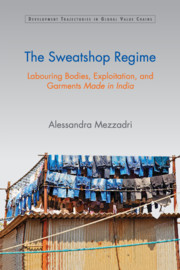Book contents
- Frontmatter
- Dedication
- Contents
- List of Tables, Figures and Pictures
- Acknowledgements
- List of Abbreviations
- Introduction
- 1 The Chain and the Sweatshop
- 2 The Commodity and the Sweatshop
- 3 Difference and the Sweatshop
- 4 The Regional Lord and the Sweatshop
- 5 The Broker and the Sweatshop
- 6 The Body and the Sweatshop
- Conclusions
- References
- Index
6 - The Body and the Sweatshop
Published online by Cambridge University Press: 23 July 2017
- Frontmatter
- Dedication
- Contents
- List of Tables, Figures and Pictures
- Acknowledgements
- List of Abbreviations
- Introduction
- 1 The Chain and the Sweatshop
- 2 The Commodity and the Sweatshop
- 3 Difference and the Sweatshop
- 4 The Regional Lord and the Sweatshop
- 5 The Broker and the Sweatshop
- 6 The Body and the Sweatshop
- Conclusions
- References
- Index
Summary
If we allow the politics of health to do no more than follow the shifting effects of the structural contradictions in the labour-reserve system … then, indeed, we do no more than accept the boundaries of suffering.
(O'Laughlin, 2013, p. 194)Poor Health, Lack of Safety: The Depletion of the Labouring Body Inside the Sweatshop
The labouring body is always central to the production and reproduction of the garment sweatshop. Indeed, as a regime based on interplays between physical and social materiality, crossed by multiple forms of difference and unfreedom and shaped by the joint work of many global and regional masters, the sweatshop provides a price tag to workers’ bodies no less than to the many garment commodities it continuously churns out. It assigns these bodies to different segments of the product cycle. It orders them on a complex employment ladder, where, as illustrated in this analysis, wages, entitlements, rewards and duties are greatly socially regimented. Effectively, the sweatshop nurtures processes of labour fragmentation also through a capillary ‘body-politics’, aimed at commodifying as well as exploiting each and every social feature of workers’ distinct corporality. In this sense, the body of workers emerges as the primary ‘raw material’ to be deployed in sweatshops to achieve and reproduce sources of comparative advantage.
Arguably, however, in this process the body is also the primary raw material depleted by the sweatshop, consumed as bolts of cloth or bundles of thread going through a stitching machine. Undoubtedly, the devastating effects the sweatshop may have on workers’ bodies have been all too clearly shown by the Rana Plaza disaster of 2013. In fact, this entailed the destruction of over a thousand of these bodies – trapped, broken, burnt to ashes, gone in a few moments. The broadcasted images of torn up garments and wreckages of stitching machinery scattered across the ground zero of the industrial disaster only provided a pale if already painful glimpse into the far more sinister and heart-breaking reality of all the lives lost in the collapse. As chillingly described by Jeremy Seabrook (2015, p. 21) in his Song of the Shirt, the bodies of the workers recovered and laid out one after the other in front of the ruins “stretched hundreds of meters in the dust and debris”.
- Type
- Chapter
- Information
- The Sweatshop RegimeLabouring Bodies, Exploitation and Garments <I>Made in India</I>, pp. 159 - 184Publisher: Cambridge University PressPrint publication year: 2016

